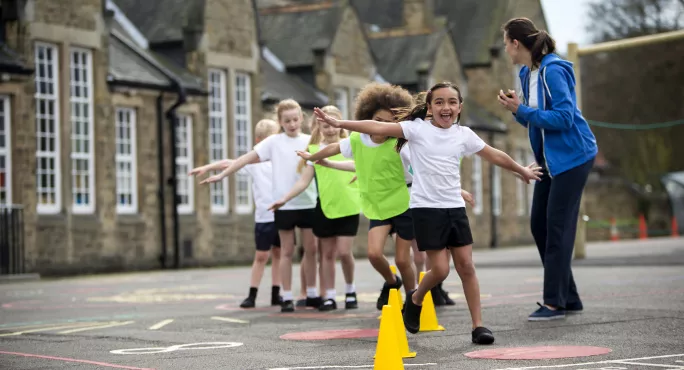Teachers told to get pupils ‘up out of their seats’ to learn

Pupils need to be “up out of their seats learning” throughout the day to improve their physical activity and health and wellbeing, a Scottish Parliament committee has been told.
Developmental psychologist Josie Booth argued this morning that we need to move away from seeing physical activity and classroom lessons as separate, and that innovative teachers were combining the two rather than “compartmentalising”.
She also told the Scottish Parliament’s Health, Social Care and Sport Committee - which is holding a short inquiry into the health and wellbeing of young people - that, while there is a belief that the pandemic has had a negative impact on young people’s physical and mental health, we currently lack to the data to know.
- Related: Is PE the most important school subject of all?
- News: First minister responds to concerns over health and wellbeing census
- Wellbeing: Attainment is ‘wrong focus’ for schools after Covid
- Data: Youngest pupils at greater risk of obesity after pandemic
- Opinion: Why we should talk about sex in school earlier
- Analysis: Why has child obesity got so bad during the pandemic?
Dr Booth - a senior lecturer in developmental psychology in the University of Edinburgh’s Moray House School of Education - said that one issue in Scotland is a lack of nationally representative data on “many of the health challenges” the country faces, including fitness, diet and obesity.
It was suggested by other members of the panel that the health and wellbeing census - which has proved controversial due to its questions relating to sex and relationships - might help make it easier to track changes in pupil wellbeing in the future.
Dr Booth said: “To improve the physical activity levels and health and wellbeing of our young people it’s not just about participation in sport, it’s about physical activity in a holistic way. So active commuting is key but also being physically active throughout the day.
“We know that there are good things taking place in schools and one of the things coming out in the research is about physically active lessons. So this old idea that children need to sit down to learn is really being challenged and we know from the evidence that children can learn just as well when they are doing things physically. And, actually, sometimes they learn in a better way when they are up out of their seats learning.
“This is often down to the innovations of teachers, where they are getting pupils outside and they are moving around, or they are using sports halls to engage movement and pairing it with learning outcomes.
“So we need to move away from thinking about physical activity as being separate from academic attainment and [start] seeing the two can be combined and they will support physical health, as well as our school attainment, rather than seeing the two as completely separate.
“So, again, it’s about thinking about the whole day and not compartmentalising school and thinking about building activity into the whole of the young person’s day, and how we can do that, and how we can support all aspects of their learning.”
In response, Mike Corbett, Scotland’s national officer for the NASUWT teaching union, highlighted that it had been harder for teachers to get pupils up and out of their seats because of rules on mixing and distancing introduced because of the pandemic. He said this meant it had been “difficult to build on some excellent work that had been done in previous years on getting kids up and about in lessons”.
He also said that, although schools had made efforts to do more outdoor learning, this was sometimes scuppered by the Scottish weather.
Mr Corbett, who was teaching until October when he took on his current role, added: “Absolutely there have been efforts in schools to try and do outdoor learning but look out the windae and that’s not particularly appealing some days.”
You need a Tes subscription to read this article
Subscribe now to read this article and get other subscriber-only content:
- Unlimited access to all Tes magazine content
- Exclusive subscriber-only stories
- Award-winning email newsletters
Already a subscriber? Log in
You need a subscription to read this article
Subscribe now to read this article and get other subscriber-only content, including:
- Unlimited access to all Tes magazine content
- Exclusive subscriber-only stories
- Award-winning email newsletters
topics in this article



